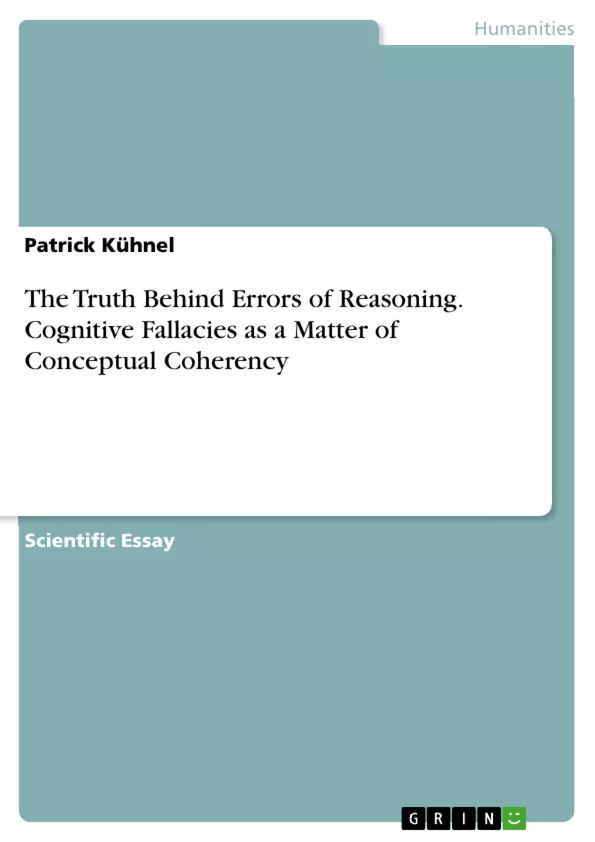Traditionally, research on cognitive fallacies has pursued a normative approach, mainly aiming at identifying the main influences that lead to erroneous response behavior such as, for example, belief bias and confirmation bias, both of which have been shown to correlate with strategies of argumentation and motivational factors.
Although it seems natural to view cognitive fallacies as a deficient form of reasoning or an effect of misplaced “gut instinct”, there is good reason to assume that so-called cognitive fallacies are actually a natural side effect of the attempt of the human mind to create a coherent scenario when the available input is ambiguous enough to allow for the construction of various conceptual metaphors to serve as a guiding mindset for the process of reasoning.
In this paper I will reexamine previous explanations in the field of cognitive fallacies in order to shed new light on the psychological mechanisms behind erroneous response behavior by further developing ideas from metaphor theory (cf. Lakoff, /Núñez 2000) and mental space theory (cf. Fauconnier 1985).
Inhaltsverzeichnis (Table of Contents)
- Summary
- 1. Introduction
- 2. The Metaphorical Foundation of Formal Rules of Derivation
- 3. Example: Belief Bias
- 4. Cognitive Representations of Syllogisms
- 5. Conclusion
- 6. Literature
Zielsetzung und Themenschwerpunkte (Objectives and Key Themes)
This work examines the nature of cognitive fallacies, specifically focusing on the role of conceptual coherence in their occurrence. It argues against the traditional view of fallacies as simply faulty reasoning or a result of "gut instinct" and suggests that they are instead a consequence of the human mind's effort to create a coherent scenario even when faced with ambiguous information.
- The influence of conceptual metaphors on formal reasoning processes
- The role of mental spaces in integrating conflicting information
- The relationship between cognitive effort, prior knowledge, and susceptibility to cognitive fallacies
- The plausibility of logical fallacies from the perspective of metaphor theory and mental space theory
- The impact of individual differences in processing speed and short-term memory on cognitive fallacies
Zusammenfassung der Kapitel (Chapter Summaries)
- 1. Introduction: This chapter introduces the research question by highlighting the influence of subjective credibility on the correctness of syllogistic conclusions. It also presents the two modes of operation in the human cognitive system, System 1 (fast-working, experience-based) and System 2 (slow-working, abstract-formal).
- 2. The Metaphorical Foundation of Formal Rules of Derivation: This chapter focuses on the role of conceptual metaphors in shaping and guiding formal reasoning processes. It delves into the process of mapping linguistically presented information onto spatial relations.
- 3. Example: Belief Bias: Using a study by Evans (2004), this chapter explores why standard explanations of cognitive fallacies fail to account for the prioritization of believability over logical coherence in some test subjects.
- 4. Cognitive Representations of Syllogisms: This chapter examines the construction of mental spaces and their role in mapping linguistic information. It highlights the potential cognitive cost associated with switching between different metaphorical frameworks.
Schlüsselwörter (Keywords)
The key terms and concepts explored in this work include: metaphor, bias, mental space, cognitive fallacies, false conclusions, System 1, System 2, conceptual coherence, and believability.
Frequently Asked Questions
What are cognitive fallacies according to this paper?
Instead of being just "faulty reasoning," they are seen as natural side effects of the human mind's attempt to create a coherent scenario from ambiguous input.
What is the difference between System 1 and System 2 reasoning?
System 1 is fast, experience-based, and intuitive, while System 2 is slow, abstract, and follows formal logical rules.
How does "Belief Bias" affect logical conclusions?
Belief bias occurs when individuals prioritize the believability of a conclusion over its logical validity in a syllogism.
What theories are used to explain these fallacies?
The paper utilizes Metaphor Theory (Lakoff & Núñez) and Mental Space Theory (Fauconnier) to reexamine psychological mechanisms.
How do conceptual metaphors influence formal reasoning?
They provide a guiding mindset that helps map linguistic information onto spatial or conceptual relations, which can lead to specific errors if the metaphor is misplaced.
- Quote paper
- Patrick Kühnel (Author), 2015, The Truth Behind Errors of Reasoning. Cognitive Fallacies as a Matter of Conceptual Coherency, Munich, GRIN Verlag, https://www.grin.com/document/337345



